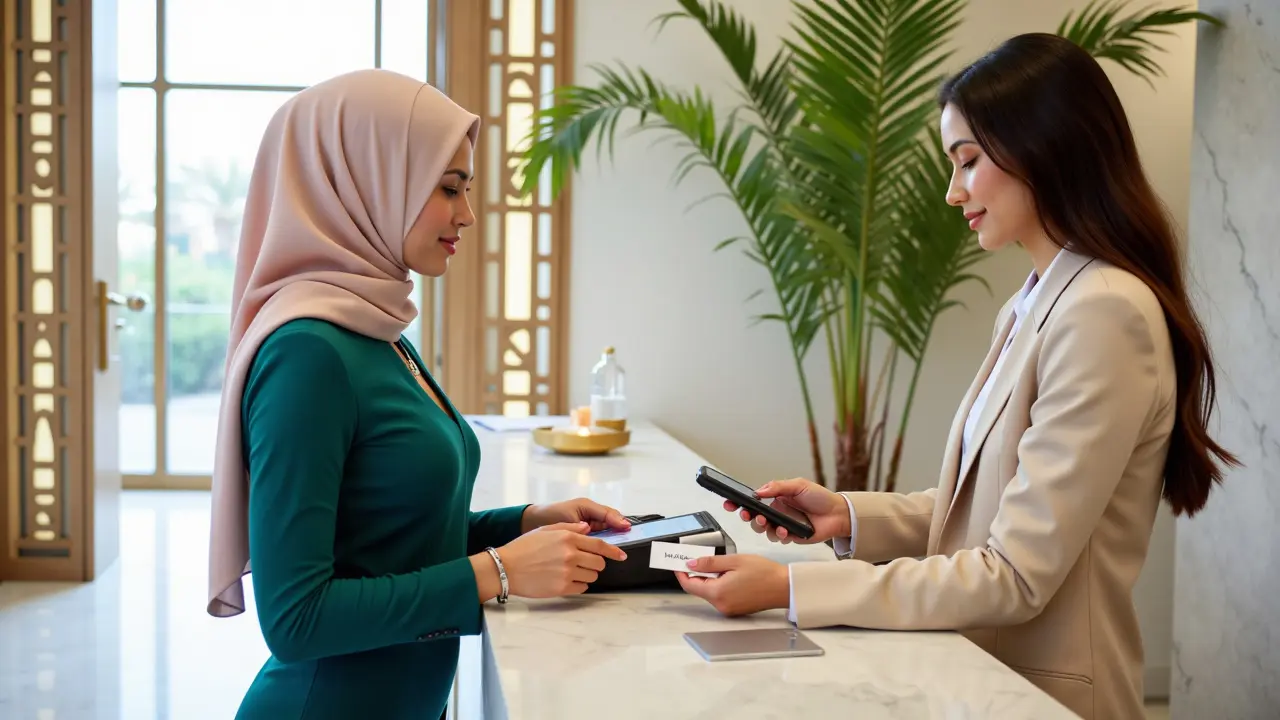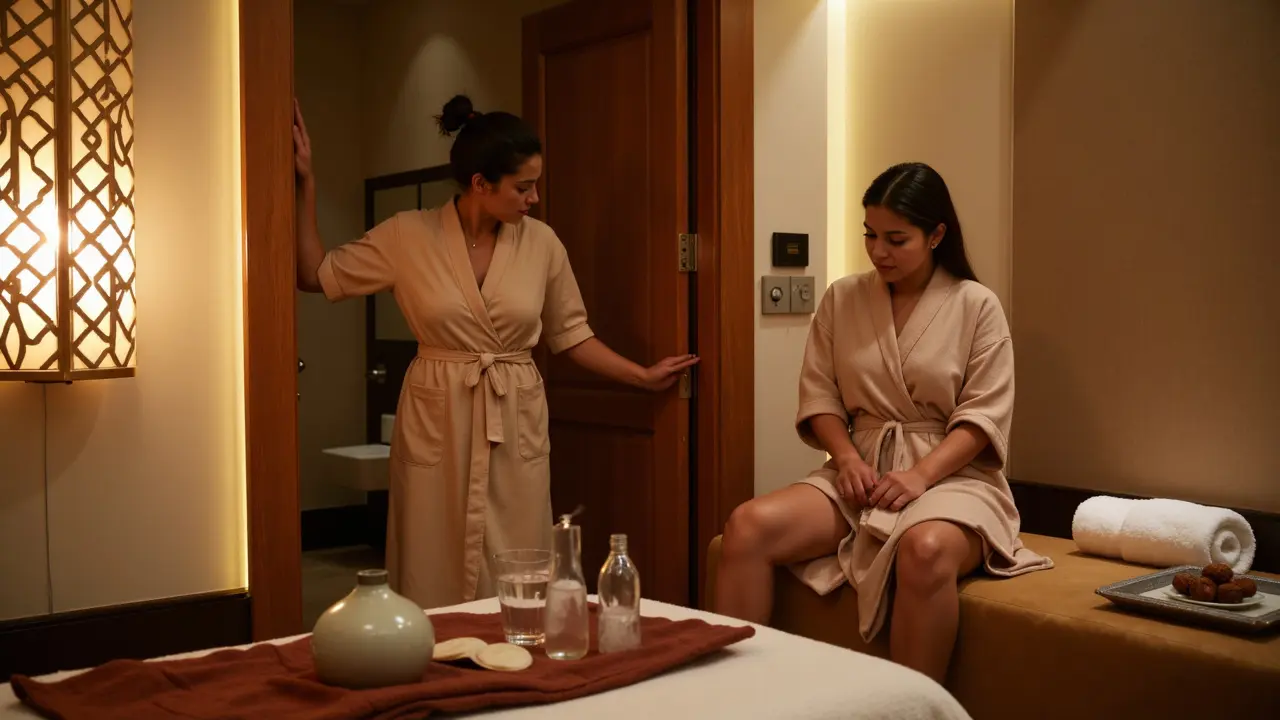You’re blissed out, face in the cradle, music like a slow tide… and then it hits you: what happens now? Are you meant to hop up, tip on the bed, wait for water, ask about rebooking? The last minutes can feel fuzzy. Here’s the clear, no-awkwardness guide to the end of a massage-what actually happens, what you should do, and how to leave feeling as good as you do on the table.
TL;DR
- Your therapist usually ends with slower, lighter strokes, tells you it’s over, and steps out so you can redress privately.
- Take your time: roll to your side, sit up slowly, sip water if offered. Mild soreness or sleepiness is normal.
- Checkout happens at the desk; tip 10-15% in Dubai if there’s no included service charge and you’re happy with the service.
- Good aftercare: hydrate for comfort, move gently, avoid super-hot baths or hard workouts for a few hours.
- Speak up if anything feels off (dizziness, pain, boundary issues). Your comfort rules from start to finish.
The End-of-Session Timeline: Exactly What Happens and What You Do
I’ll walk you through the final 10-15 minutes so there’s zero guesswork. Different styles vary a bit (Swedish vs. deep tissue vs. Thai), but the flow is surprisingly consistent in hotel spas, wellness centers, and sports clinics-here in Dubai and pretty much everywhere.
Minute -10 to -5: The slow-down. You’ll feel the pace change. Strokes get longer and lighter; pressure eases. In Thai or sports massage, you might get a gentle stretch sequence instead of long strokes. If hot stones were used, they’ll be removed; towels replace them to hold warmth.
Minute -2 to 0: The closing touch. Most therapists finish with stillness: a palm resting briefly on your shoulders, feet, or back-a nonverbal “we’re done.” Some say softly, “That’s the end of your session. Take your time getting up. I’ll step out and bring water.” You’re still draped the entire time.
Minute 0-3: Private time. They leave and close the door. This is your moment. Don’t rush. A lot of people get headrush standing too quickly-very normal, called orthostatic lightheadedness.
- Roll to your side first, take two breaths, then push up to sit.
- Sit for 15-30 seconds. Wiggle your ankles and fingers to wake your circulation.
- Stand slowly. If you feel dizzy, sit again and wait; nobody will mind.
- Blot any extra oil with the towel or robe provided; get dressed at your pace.
Minute 3-6: Water, check-in, and next steps. Your therapist will knock before re-entering (or meet you outside the room). You’ll usually get a glass of water or tea, and a quick check-in: “How are you feeling?” They may share focused feedback: “Your left shoulder was tighter; we spent extra time there.” If you booked a clinical session (sports or physio-led), you might get quick home-care pointers or stretches.
Minute 6-10: Checkout. You’ll head to reception to settle the bill, tip if you wish, and rebook or buy a package if you want. Boutique studios sometimes settle in-room; hotel spas and clinics use the desk. Ask for product names if you loved an oil or balm-many spas in Dubai retail the exact blends.
Quick scripts if you need them:
- Need more time: “I’m a bit lightheaded-mind if I sit a minute?”
- Want silence: “Could we keep the last five minutes quiet?”
- Prefer different aftercare: “I’ll skip tea, but water would be great.”
Style-specific endings in 30 seconds:
- Swedish/Relaxation: Long, feather-light strokes end the session. You’ll be cocooned in towels while they step out.
- Deep Tissue: Slow finish with lighter pressure, maybe a heat pack before they leave. Expect localized tenderness tomorrow.
- Sports/Clinic: Quick re-check of range of motion; brief home advice (ice/heat, stretches). Less spa ritual, more practical talk.
- Thai: Often ends seated, with a gentle stretch or compression sequence. You’ll still get time to regroup before you stand.
- Prenatal: You’ll be helped to side-lying; they’ll ensure you’re steady before leaving the room.
Redress etiquette made easy: You keep underwear on or off based on your comfort and the style you booked. Either way, you’re always fully draped during the massage and fully private when dressing.
Fast decision tree (when in doubt):
- Feel woozy? Sit or lie back down, ask for water. Take 2-3 minutes.
- Not satisfied? Tell reception right away: “My shoulder was missed; I wanted more focus there.” Good spas fix this-credit, extra time, or a better fit next time.
- Loved it? Rebook while you’re there to lock your preferred therapist/time. Busy Dubai weekend slots vanish fast.

Etiquette, Tipping, and Checkout (Dubai-Friendly, Zero-Awkwardness Guide)
End-of-session manners shouldn’t be a mystery. Here’s how to avoid the micro-awkwards so you can float out happy.
Talking vs. quiet: If you prefer silence at the end, say so. If you want notes, ask: “Any spots I should stretch more?” Both are fine. Therapists are trained to take your lead.
Where to tip and how much:
- Dubai hotel spas: Bills often include a service charge (typically 10%) plus tax. That fee may not go directly to your therapist. If service isn’t already inclusive, a 10-15% tip is common when you’re pleased.
- Boutique studios/day spas: Tipping is appreciated but never mandatory. 10-15% is the usual range if no service charge is listed.
- Medical/physio clinics: Policies vary; many don’t accept tips. A grateful “thank you” or a review is perfect.
- Best bet: Ask reception, “Is gratuity included, and does it go to the therapist?” No one is offended by clarity.
Cash vs. card: Card works almost everywhere in Dubai. Cash tips are often handed directly to the therapist if you want to make sure they receive it, but follow venue policies.
Rebooking without pressure: If you had a great match, rebook the same therapist before you leave. Prefer to decide later? Take a photo of the business card and ask for the therapist’s schedule pattern (e.g., weekdays only, late shifts).
Boundaries and consent still apply at the end: If a therapist lingers in the room while you dress, ask for privacy: “Could you give me a minute, please?” Doors should be closed; draping should be maintained until the therapist exits.
When to leave a review: If you’d send a friend, it’s review-worthy. Be specific: “Focused neck work eased my desk tension for two days.” It helps other clients and supports good therapists.
Quick comparison you can actually use:
| Venue Type | End-of-Session Feel | Where You Pay | Tipping Norm (Dubai) | Extras |
|---|---|---|---|---|
| Hotel Spa | Ritualized, tea/water, calm exit | Reception desk | 10-15% if no gratuity included | Thermal areas; ask if access is included |
| Boutique Studio/Day Spa | Personal touch, product recommendations | Desk, sometimes in-room | 10-15% typical | Packages and loyalty points |
| Sports Clinic/Physio | Brief debrief, home exercises | Reception (medical invoice) | Varies; often no tips | Insurance receipts, clinical notes |
| Mobile Therapist (Home/Hotel) | Simple wrap-up, pack-down | App or cash | 10-15% if you’re happy | Give them a clear, private space |
Local sanity-check: In Dubai, legit spas hold proper licenses (Dubai Municipality for spas; Dubai Health Authority for medical/rehab settings). Pick places that display credentials and follow clear draping and privacy protocols. If anything feels off, speak to the manager.
Pro tip if you hate small talk at checkout: Decide your answer to “Would you like to rebook?” before you stand up. A simple, “Not today, I’ll book online,” keeps it neat.

Aftercare, Side Effects, and Red Flags: Feel Great Now and Tomorrow
What you do right after matters. Not because you’re “flushing toxins”-that’s a myth-but because your nervous system just downshifted. Good aftercare stretches that calm feeling into the next day.
What’s normal after a massage:
- Sleepiness or lightheadedness: Your body slid into rest-and-digest mode. Move slowly for an hour.
- Mild soreness or tenderness: Especially after deep tissue or sports work. Research in sports medicine journals reports massage can reduce next-day muscle soreness modestly; a bit of tenderness itself is common for 24-48 hours.
- Thirst: You were under warm towels in a cozy room. Hydrate for comfort, not “detox.”
What to do in the first 2-4 hours:
- Drink water or herbal tea. No need to chug-sip to thirst.
- Go for a light walk. Gentle movement helps circulation and keeps you from stiffening up.
- Skip heavy lifting and high-intensity training until later or tomorrow, especially after deep work.
- Keep heat moderate. Super-hot baths or saunas right away can spike lightheadedness.
- Leave nourishing oils on skin for a couple of hours if you liked the feel; shower anytime you prefer.
Style-specific aftercare:
- Deep Tissue/Sports: Alternate warm shower and gentle stretches. If very tender, brief cool compress (10 minutes) on the focused spot can soothe.
- Lymphatic Drainage: Very light water intake through the day, avoid tight clothing, keep activity gentle. You might pee more-that’s expected.
- Prenatal: Rise in stages; snack soon after. If dizziness persists, call your provider.
- Cupping/Guasha add-ons: Circular marks are normal and not bruises from trauma; they fade in a few days. Keep the area warm and covered.
Evidence corner (plain English): The U.S. National Center for Complementary and Integrative Health notes massage is generally safe for healthy adults and that temporary soreness, sleepiness, or mild headache can occur after sessions. The American Massage Therapy Association’s client guidelines emphasize hydration for comfort and movement for recovery, not toxin flushing. Sports science studies report small-to-moderate reductions in delayed-onset muscle soreness after massage; it’s not magic, but it helps.
Red flags-speak up immediately if you notice:
- Persistent dizziness, sharp pain, numbness, or unusual swelling post-session.
- Pressure to buy products or rebook that ignores your “no, thank you.”
- Boundary issues: therapist re-enters without knocking, doesn’t give privacy to dress, or ignores your feedback on pain levels.
Mini-FAQ you might be too shy to ask:
- Do I get dressed before they come back? Yes. They’ll step out and knock before re-entering. If they don’t, ask for a minute.
- Should I shower right away? Your call. Leaving oils on for a couple of hours can feel great; if you’re heading to work, a quick rinse is fine.
- What if I fall asleep? Totally fine. Many people do. You’ll be woken gently at the end.
- Is it rude not to tip? Tipping is discretionary. In Dubai, 10-15% is common for good service if no gratuity is included. At medical clinics, check policy.
- Can I cry or feel emotional? It happens. Massage can release tension in more ways than one. No need to explain unless you want to.
- What if I have makeup/hair concerns? Ask them to avoid oil near hairline or use face cradle covers that protect makeup. They can adjust.
- How do I handle a less-than-great session? Tell the desk calmly and specifically: “Too light on upper back despite asking twice.” Good venues want to fix it.
Little things that extend the glow:
- Eat something light with protein within an hour-keeps you from crashing.
- Block five minutes in your calendar to note what worked: therapist’s name, pressure, focus areas. Gold for your next booking.
- Set a reminder in 4-6 weeks if you’re managing stress or desk pain-that’s a realistic cadence for many.
Personas and next steps:
- First-timer, a bit anxious: Ask for a two-minute quiet finish. Sit up slowly; tell the desk you might rebook after you see how you feel tomorrow.
- Desk worker with neck pain: After the session, book 3-4 targeted visits two weeks apart. Ask for 5 minutes of neck mobility homework at checkout.
- Runner or gym-goer: Go for an easy 20-minute walk that evening; save speed work for tomorrow. Rebook within 1-2 weeks during heavy training phases.
- Prenatal (second/third trimester): Schedule daytime slots, snack pre- and post-session, and ask for extra time to stand up. Keep communication open if any position feels off.
- Stress relief seeker: If sleep is your goal, choose evening slots, silence the phone, and ask for a slow, quiet closing and dim lights.
Last practical bits: If you loved the music, ask for the playlist name. If a particular oil felt amazing, jot it down; many Dubai spas carry premium blends you can use at home. And if you prefer not to chat after, it’s fine to say, “I’m in a little cloud-thank you so much,” smile, and glide out.
That’s the end-game, start to finish: a gentle slow-down, your private time to reset, a thoughtful handoff to the desk, and simple aftercare that keeps the calm humming. No awkward moments, no mystery-just you leaving lighter than you came in.







August 27, 2025 AT 14:53
There is a whole little ritual at the very end of a massage that most people breeze through without thinking, and it is precisely that ritual which determines whether you leave feeling buoyant or a bit off-kilter.
The therapist slows the rhythm, eases pressure, and offers you a tiny bridge back to upright life rather than slamming the brakes on your relaxed nervous system, and that makes a measurable difference in how your autonomic state shifts over the next hour. You will be draped the whole way which preserves privacy and prevents awkwardness while you reorient. The moment the therapist steps out is not an absence but a designed pause-use it to roll to your side, breathe, and let your blood pressure recalibrate. Standing up too fast causes the classic headrush, and that small misstep is responsible for more ruined post-massage smiles than any other minor error. Hydration helps with subjective comfort though it is not a mystical cure for anything that was not addressed on the table. If you get tenderness after aggressive work, gentle movement and contrast showers can help, and a tiny cold compress will blunt sharp localized ache without changing the therapeutic gains. The checkout choreography matters: if a service charge is ambiguous it can create awkwardness, and clarity upfront is the friend of good endings. The therapist’s brief recap of focus areas is a helpful data point for future sessions and is best absorbed right away rather than filing it mentally and forgetting. If a venue pushes product or package sales right at the door that is not a casual suggestion but an operational habit, and you should read it as such before deciding. Privacy boundaries must be explicit; a closed door, a knock, and a pause to let you dress are not optional niceties but core professional practice. Prenatal work, sports sessions, and deep tissue all require slightly different finish lines and the clinician usually signals that difference clearly, you just have to follow the simple cues. A good therapist will protect your dignity first and offer practical aftercare second, and both are equally important. Rebooking in the moment secures the best slots and builds continuity, which is where real progress comes from. Finally, if anything feels off-dizziness that persists, numbness, or undue pressure to buy things-treat that as a red flag and escalate to management or your clinician.